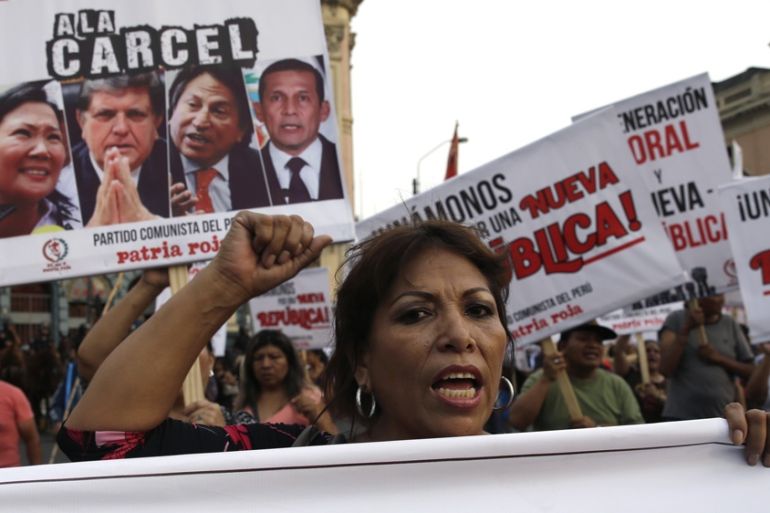Peruvians vote in referendum on fighting corruption
Most of the proposed measures are expected to pass in a nation where trust in elected officials is low.

Polls have opened in Peru’s referendum aimed at curbing corruption as the South American nation tries to put an end to the scourge that has landed politicians, judges and even former presidents behind bars.
Voters headed to 5,398 polling stations that will close at 21:00 GMT across the country on Sunday in addition to stations set up in embassies and consulates for Peruvians living abroad.
Keep reading
list of 4 itemsVietnam tycoon Truong My Lan sentenced to death in $12.5bn fraud case
Mexico cuts ties with Ecuador after police raid embassy
What’s behind the latest US sanctions on Zimbabwe President Mnangagwa?
Casting a vote is mandatory and failure to comply with it is punishable with a fine. The national office of electoral processes will deliver the first results at 01:00 GMT on Monday.
The four questions on the ballot include measures that would prohibit legislators from immediate re-election, create stricter campaign finance rules and reform a scandal-tainted council charged with selecting judges.
Most of the proposed measures are expected to pass in a nation where trust in elected officials is low.
But analysts caution that the referendum is not an end-all fix that can reverse decades of deeply entrenched political misconduct.
“What this referendum is potentially giving the government and maybe even the political system is a little breathing room,” Steve Levitsky, a Havard University political scientist told Associated Press news agency.
“A little burst of confidence and public trust that it can potentially use to get up and running,” he added.
Corruption scandals
In recent years, Peru has been jolted by the Odebrecht corruption scandal, which has toppled some of Latin America’s highest-ranking politicians.
The Brazilian construction company has admitted to paying $800m to officials throughout the region in exchange for lucrative public works contracts, including $29m to win contracts in Peru over the course of three administrations.
The scandal has tainted the careers of nearly every former living Peruvian president, with four ex-heads of state under probe for ties to Odebrecht.
President Pedro Pablo Kuczynski resigned in March after opposition politicians revealed previously undisclosed ties between Odebrecht and his private consulting firm.
Prosecutors are also investigating former leader Alan Garcia after revelations that bribes were made during the construction of Lima’s metro under his tenure.
Ollanta Humala, who was briefly jailed, and Alejandro Toledo are also being probed for allegedly receiving illegal payments.
Meanwhile, former first daughter Keiko Fujimori, the nation’s top opposition leader and a two-time presidential candidate, is under investigation for allegedly laundering Odebrecht money for her 2011 campaign.
Those probes, along with a series of leaked wiretaps showing judges and lawyers making backroom deals on matters as grave as the sentence for a man accused of raping a young girl, have unleashed the fury of a Peruvian public fed up with corruption.
A recent survey by Latinobarometro, a respected regional polling firm, found that just eight percent of Peruvians trust the legislature, the lowest rate in the region.
“The entire system is rotten,” said Gerardo Polo, 40, who works at an import company and was eager to cast his ballot on Sunday.
While he conceded that the measures won’t guarantee future abuses he said: “It is a scream of rage.”